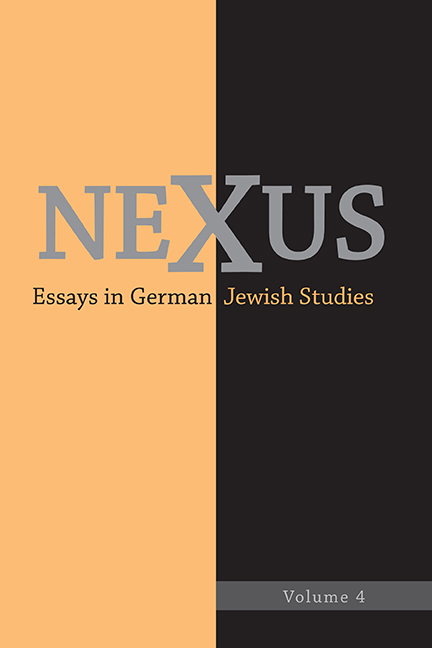Book contents
- Frontmatter
- Dedication
- Contents
- Acknowledgments
- Introduction
- Kafka, Childhood, and History
- The Black, White, and Gray Zones of Schindler's List: Steven Spielberg with Primo Levi
- Nexus Forum: A German Life: Edited and Introduced by Brad Prager
- Perspectives on A German Life
- “No False Remorse”: A Workshop with Florian Weigensamer, Director of A German Life (2016)
- Only Skin Deep
- A Brunhilde for Our Time: Eliding the Questions in A German Life
- Hitler's Helpmates
- Zooming in on Moral Guilt: A German Life as an Artistic Public Trial
- Framing the Beldame in A German Life and Blind Spot
- Special Section on George Tabori: Edited and Introduced by Martin Kagel
“No False Remorse”: A Workshop with Florian Weigensamer, Director of A German Life (2016)
from Nexus Forum: A German Life: Edited and Introduced by Brad Prager
Published online by Cambridge University Press: 31 August 2018
- Frontmatter
- Dedication
- Contents
- Acknowledgments
- Introduction
- Kafka, Childhood, and History
- The Black, White, and Gray Zones of Schindler's List: Steven Spielberg with Primo Levi
- Nexus Forum: A German Life: Edited and Introduced by Brad Prager
- Perspectives on A German Life
- “No False Remorse”: A Workshop with Florian Weigensamer, Director of A German Life (2016)
- Only Skin Deep
- A Brunhilde for Our Time: Eliding the Questions in A German Life
- Hitler's Helpmates
- Zooming in on Moral Guilt: A German Life as an Artistic Public Trial
- Framing the Beldame in A German Life and Blind Spot
- Special Section on George Tabori: Edited and Introduced by Martin Kagel
Summary
A GERMAN LIFE (2016) is a feature-length documentary consisting primarily of an interview with Brunhilde Pomsel, who was hired at the Third Reich's Propaganda Ministry in 1942 and worked as a secretary in Joseph Goebbels's office until 1945. In May of that year, after the German surrender, Pomsel was taken prisoner by the Soviet Army and was interned for five years in camps, including Buchenwald, Hohenschönhausen, and Sachsenhausen. Following her release, she returned to work in broadcasting until her retirement in 1971.
The film's four directors, Christian Krönes, Olaf Müller, Roland Schrotthofer, and Florian Weigensamer, interviewed Pomsel. She is rendered in high-contrast black and white, and she frequently looks directly into the camera while recounting her memories. At the time the interview was conducted, she was 103 years old, and she lived three more years, which was long enough to attend a screening of A German Life at the Munich Film Festival in 2016. When she passed away on January 27, 2017, she was living in a rest home in Munich.
Although Pomsel appears extraordinarily alert and coherent during the film's interviews, the dense pattern of wrinkles crisscrossing her face reveals her advanced age. The directors chose to highlight this feature, zooming in closer rather than pulling away, possibly because they found themselves entranced by Pomsel as an image of living history. She knows that the decisions she made during the war were opportunistic, but does not act like someone who regrets her choices, and she makes few apologies. She is no revisionist, but she is not particularly concerned with working through the Nazi past. It is difficult to believe that she was as unaware as she claims to have been, and her account is sometimes undercut by its many contradictory positions, most notably that in her capacity as secretary she typed thousands of documents for Goebbels, but that she knew nothing about the fate of the Jews. The directors also include archival propaganda footage at regular intervals in the film, underscoring the unmistakably and relentlessly ideological atmosphere in which she worked.
- Type
- Chapter
- Information
- Nexus 4Essays in German Jewish Studies, pp. 57 - 66Publisher: Boydell & BrewerPrint publication year: 2018



